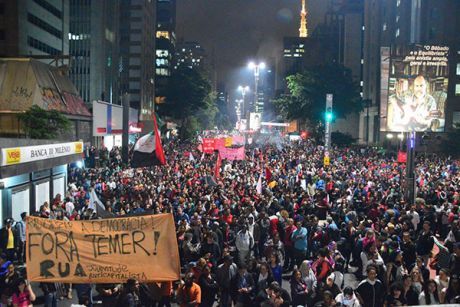Shared
You are here
Brazil's new right wing government faces opposition in the streets

May 28, 2016
In its first days in office, Brazil’s new government led by president Michel Temer has already faced spirited opposition. Some 20,000 took to the streets in Sao Paulo to denounce an illegitimate government, in a march led by the militant homeless workers’ movement.
The previous day Brazil’s senators voted to continue impeachment proceedings against former president Dilma Rousseff of the Workers’ Party (PT) for state accounting irregularities. Vice president Michel Temer assumed the presidency temporarily for up to 180 days, signalling an intensification of the neoliberal political agenda started by Rousseff.
The Sao Paulo demonstrators marched on the headquarters of Brazil’s principal bosses’ union in opposition to austerity and cuts to social programs.
The next day Ministry of Culture workers protested in the capital Brazilia against the “parliamentary coup” and funding cuts with shouts of “Culture Yes! Coup No!”.High school students in four states continue their militant occupation movement against local cuts to education funding. There are 33 schools occupied in the state of Ceara and dozens more in Rio de Janeiro, Sao Paulo and Rio Grande do Sul. They face constant police repression.
Unable to win an election democratically, Brazil’s right-wing has used a huge kickback scandal in the state petroleum company Petrobras to exploit Rousseff’s impeachment.
Allies
Temer’s first act as president was to appoint an all-male, all-white group of 23 political allies as ministers with key representatives from the evangelical Christian and agri-business sectors. Yet seven of them are under investigation for corruption in the Petrobras scandal. Their plan is to further privatise state assets, cut social programs and workers’ rights, and impose a strict law and order regime.
The new government and emboldened ruling class’s promise of a new wave of attacks backed up by police repression poses clear challenges for the unions and social movements.
The Workers’ Party is disgraced. Its adoption of neoliberalism has alienated much of its base. And while many PT militants are opposed to the coup, they are demoralised after years of anti-worker policies by their own party.
The small but growing socialist left is faced with the same challenge as before the political crisis erupted in 2015. Whether the cutbacks come from the PT or the right wing forces who lined up behind the impeachment campaign, the key task is to rebuild the movement against austerity.
This is shared from Socialist Worker (UK)
Section:









